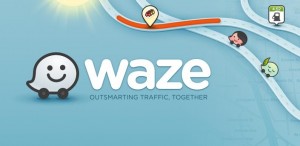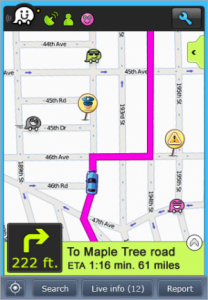If you’re ever lost your mind worrying that the 3-mile back up at the Lincoln Tunnel was going to make you miss dinner, you’ll appreciate the unique value of the traffic app Waze.
Waze provides drivers with local maps of accurate, real-time traffic information. The information doesn’t come from a traffic helicopter or from cameras stationed on tool booths, but from data supplied by individual drivers right there on the road with you. The data is gathered, analyzed and presented to drivers on their own mobile devices. Drivers can confidently decide whether to ditch the Lincoln Tunnel and head north to the GWB, or relax knowing things will clear up so they’ll make it home on time.
Waze is a great product because it solves an acute pain for the user.
It’s also a terrific example of how one company, through its product and business model, can create a complete Boost Economy.
How Waze Works
Waze depends on drivers’ willingness to share individual data with an expectation of reciprocity. Waze only works if other people in front of you contribute their data on your behalf, and if you contribute your data to the people behind you.
Before Waze can create value, each user must share information about her drive in real time. The driver activates the Waze app on her mobile device, and then keeps the data flowing by keeping the app on as she drives. The mobile device and its internal GPS system communicate real time data about speed and location, which gets mapped along with the data from other travelers on the same roads at the same time. The information from travelers in front of you allows Waze to estimate the traffic flow on that road and roads nearby, giving you real time information about your options for making your progress as swift as possible.
Waze gives each kind of user a boost of information that they can use to improve whatever it is that they are doing. In my case, I’d be able to choose a better route over the Hudson using information I can get nowhere else.
Users Share Data, Waze Transforms Information, Everyone wins
However, it’s the Waze app itself that turns these individual streams of data into information that’s valuable. Drivers’ data has to be processed through the Waze app so that it can aggregate the data, make geographic sense of it (e.g., puts it on the road map), use its own algorithms to estimate the speed and the density of traffic, and then display this information on an easy to read traffic map.
Waze estimates that, on average, its users saves 5 minutes of driving time per day.
That nets out to more than 2 million hours of traffic a year that users are able to avoid. Each user is able to devote that saved time to something more important. The Waze app also has other functions, and Waze users can also volunteer to play additional roles (e.g., by sharing information about specific delays like tractor-trailer spills, by adding new roads to the maps, and by adding comments about road construction). Everyone’s capacity to do what they want to do is increased. In the eco-system of players everyone wins.
Waze (The Business) Creates the Foundation For the Boost
Waze provides the foundation that everyone (themselves included) builds on to create value. Their business model, formally called a multi-party/multi-market platform, is designed to match players with different contributes to players with different needs to fill. Waze (the company) designed their app intentionally to be open, free, and crowdsourced. It’s easy for users to give and get value simply by using the tool itself. 
In addition, the platform is designed so that each player’s participation generates more value that that particular player needs to capture. Each driver is happy to receive real-time traffic information simply by turning the app on. Drivers don’t worry about whether they’ve created more value for the drivers behind them than they themselves received from the people in front of them. (If you were just driving to Ikea, but the people behind you were late for a wedding, you could argue that they received more value from the app than you did. But really, nobody cares.)
In the meantime, Waze analyzes the aggregated data over time and identifies opportunities to sell ads and adjacent travel services. Waze is able to calculate the direct revenue that they receive for the value they provide to drivers. Although drivers/users are unlikely to quantify the money saved by spending less time in traffic, everybody’s satisfied by the value they receive. The Waze platform generates additional value that many of the users don’t even recognize.
It’s the drivers’ activity that, over time, helps Waze offer the most complete and accurate maps of roads that drivers actually use. These maps are not only highly accurate, but also they are ‘owned’ by Waze. Waze doesn’t have to license map data from Google (in fact, it actually sells map data to Apple).
Waze and the drivers who use it can’t create value without each other. Relative to the individual drivers, Waze has more power. Waze sets the basic terms of participation, determines how the app functions, and decides what information features are made available.
Still, there is room for drivers to contribute at higher levels for different kinds of additional value if they choose to. They can join local groups, participate in games, earn badges, work on expanding and correcting the map data base, and more. The Waze platform provides a social community on top of the shared value, that members can engage in as they wish.
Waze has build a profitable business by providing a platform that makes it easy for users give what they have and get what they need. By doing a little extra analysis and selling on the back end for their own profit, Waze has created an economy / network/ ecosystem/ community that makes money and that makes everyone’s work easier.
If one clever little app can create a boost economy of 30 million happy users, what could your business do?
 I am an organizational consultant, change advocate, and organizational identity/reputation scholar with a PhD in leadership & organizations. I research, write about, and consult with organizations on the relationships between organizational identity, actions, and purpose. I teach Technology Management, part-time, at Stevens Institute of Technology.
My current research focuses on how social technologies in the workplace can drive organizational change, generate meaning, and catalyze purpose. See the
I am an organizational consultant, change advocate, and organizational identity/reputation scholar with a PhD in leadership & organizations. I research, write about, and consult with organizations on the relationships between organizational identity, actions, and purpose. I teach Technology Management, part-time, at Stevens Institute of Technology.
My current research focuses on how social technologies in the workplace can drive organizational change, generate meaning, and catalyze purpose. See the 
Comments on this entry are closed.
{ 1 trackback }